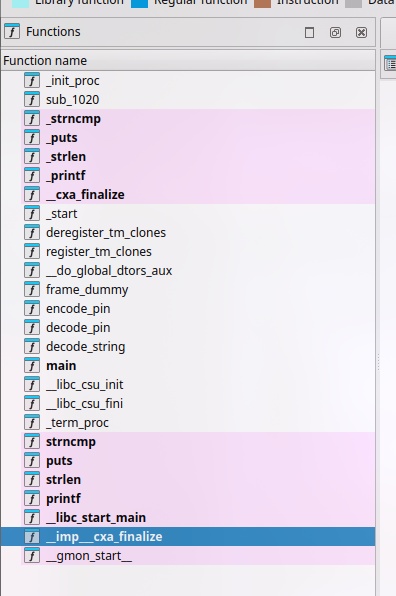Authorize by PIN
Small easy crackme, where you gotta guess the pin :)
- Category: rev
- Challenge author: AnanasCharles
- Challenge link: crackmes.one
Solution:
1. Use IDA to decompile the binary
As the binary file is not stripped, we can notice functions like main, encode_pin,decode_pin and decode_string

2. Analyze main function
int __fastcall main(int argc, const char **argv, const char **envp)
{
size_t v4; // rdx
const char *v5; // [rsp+10h] [rbp-30h]
size_t v6; // [rsp+28h] [rbp-18h]
char *s1; // [rsp+38h] [rbp-8h]
if ( argc == 2 )
{
s1 = (char *)decode_pin(argv[1], argv, envp);
v6 = strlen(argv[1]);
v4 = strlen("8446");
if ( !strncmp(s1, "8446", v4) && v6 == strlen(s1) )
{
puts("Correct PIN entered!");
v5 = (const char *)decode_string("}|.wOlHtc}j@z9jf3 O Q", argv[1]);
printf("Decoded String: %s\n", v5);
return 0;
}
else
{
puts("This is not right");
return 1;
}
}
else
{
printf("Usage: %s <pin>\n", *argv);
return 1;
}
}
From the main function, there are key points would like to highlight:
- To execute the file,
./authorize <PIN>, as it will check the second argument - After that the
<PIN>that was input will be use by callingdecode_pin()-> need futher analysis - After
decode_pin()function, the value will be stored as s1 - v6 stores the length of the raw input of PIN
- v4 is set to the length of “8446” which is 4
- First comparison: s1 (decoded PIN) must be equal to “8446” and v6 has the length of 4
3. Analyze decode_pin function
_BYTE *__fastcall decode_pin(__int64 a1)
{
int v2; // [rsp+10h] [rbp-8h]
int i; // [rsp+14h] [rbp-4h]
for ( i = 0; i <= 3; ++i )
{
v2 = *(char *)(i + a1) - 53;
decoded_pin_1[i] = v2 + (v2 < 0 ? 0xA : 0) + 48;
}
byte_4089 = 0;
return decoded_pin_1;
}
From decode_pin function, it does:
- perform looping for each character and transform it by subtract 53 by ASCII value
- In short:
input[0]='8'+53-48
input[1]='4'+53-48
input[2]='4'+53-48
input[3]='6'+53-48
Here the decoding script:
def test_pin(input_pin):
result = ""
for c in input_pin:
v2 = ord(c) - 53
if v2 < 0:
v2 += 10
result += chr(v2 + 48)
return result
# We know the target is "8446"
# Let's try all possible single-character inputs to find our mapping
def find_pin():
target = "8446"
result = ""
# For each position
for target_digit in target:
found = False
# Try all possible ASCII characters
for i in range(128): # Standard ASCII range
test_char = chr(i)
decoded = test_pin(test_char)
if decoded == target_digit:
result += test_char
found = True
break
if not found:
print(f"Could not find mapping for {target_digit}")
return None
return result
def decode_string(encoded_str, pin):
result = ""
pin_len = len(pin)
for i in range(len(encoded_str)):
v5 = ord(encoded_str[i]) - ord(pin[i % pin_len])
if v5 <= 31 or v5 > 126:
v5 = (v5 + 63) % 95 + 32
result += chr(v5)
return result
# Find the correct PIN
pin = find_pin()
if pin:
print(f"Found PIN: {pin}")
print(f"Verification (should be 8446): {test_pin(pin)}")
# Decode the secret message
encoded_message = "}|.wOlHtc}j@z9jf3 O Q"
decoded_message = decode_string(encoded_message, pin)
print(f"\nDecoded message: {decoded_message}")
else:
print("Failed to find valid PIN")
The correct PIN will be: 3991
4. Try it with the correct PIN
$ ./authorize 3991
Correct PIN entered!
Decoded String: JCTF{3nC0D1nG_15_FuN}